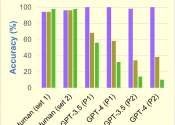Why GPT detectors aren't a solution to the AI cheating problem
In the wake of the high-profile launch of ChatGPT, no fewer than seven developers or companies have countered with AI detectors. That is, AI they say is able to tell when content was written by another AI. These new algorithms ...
May 18, 2023
1
248









